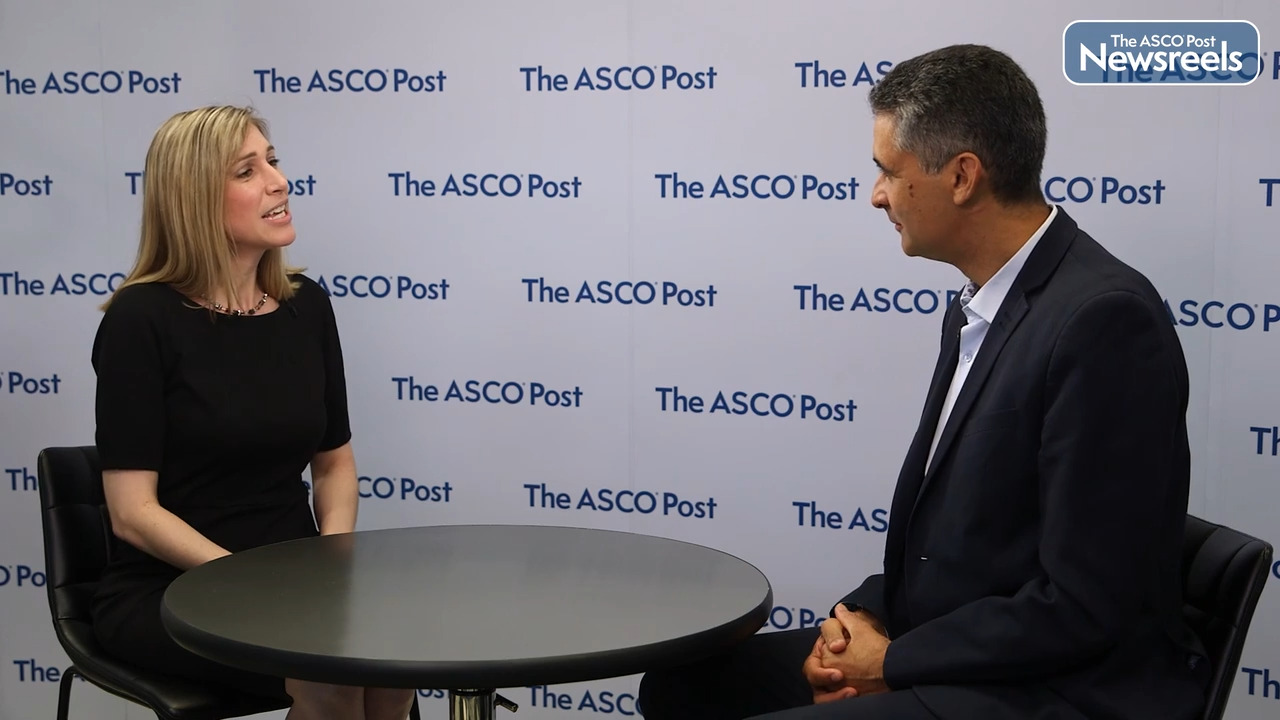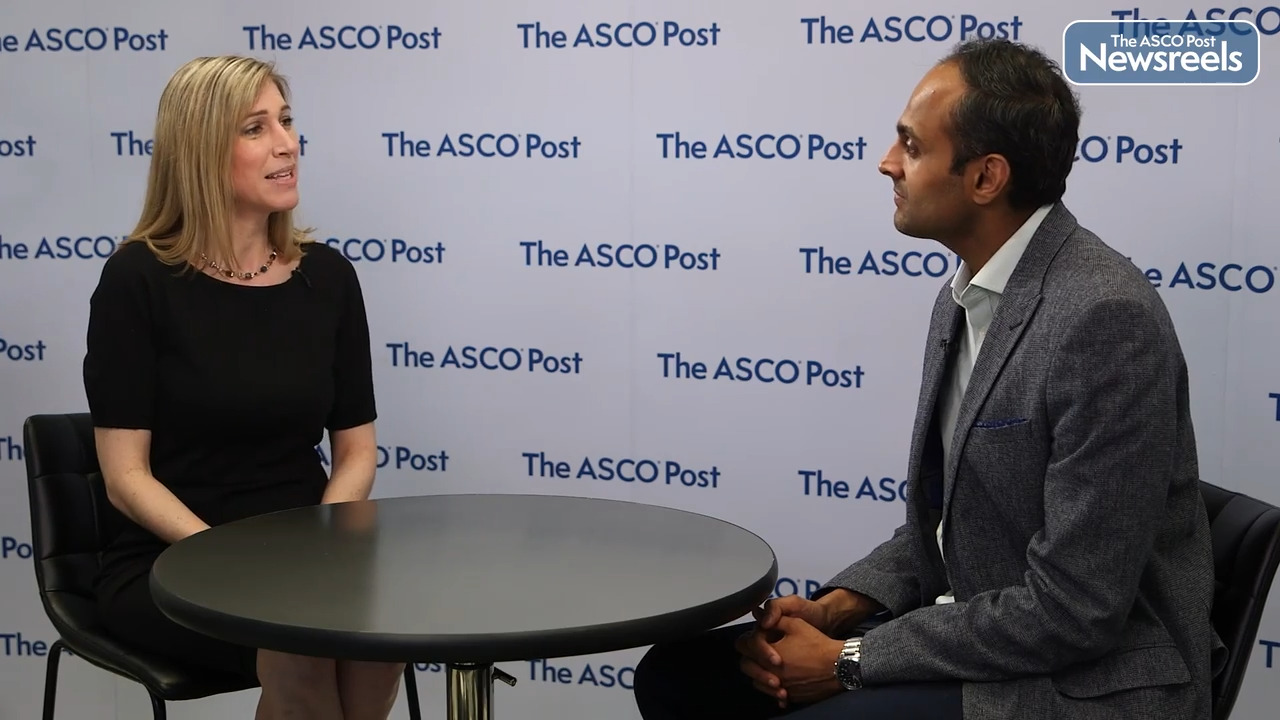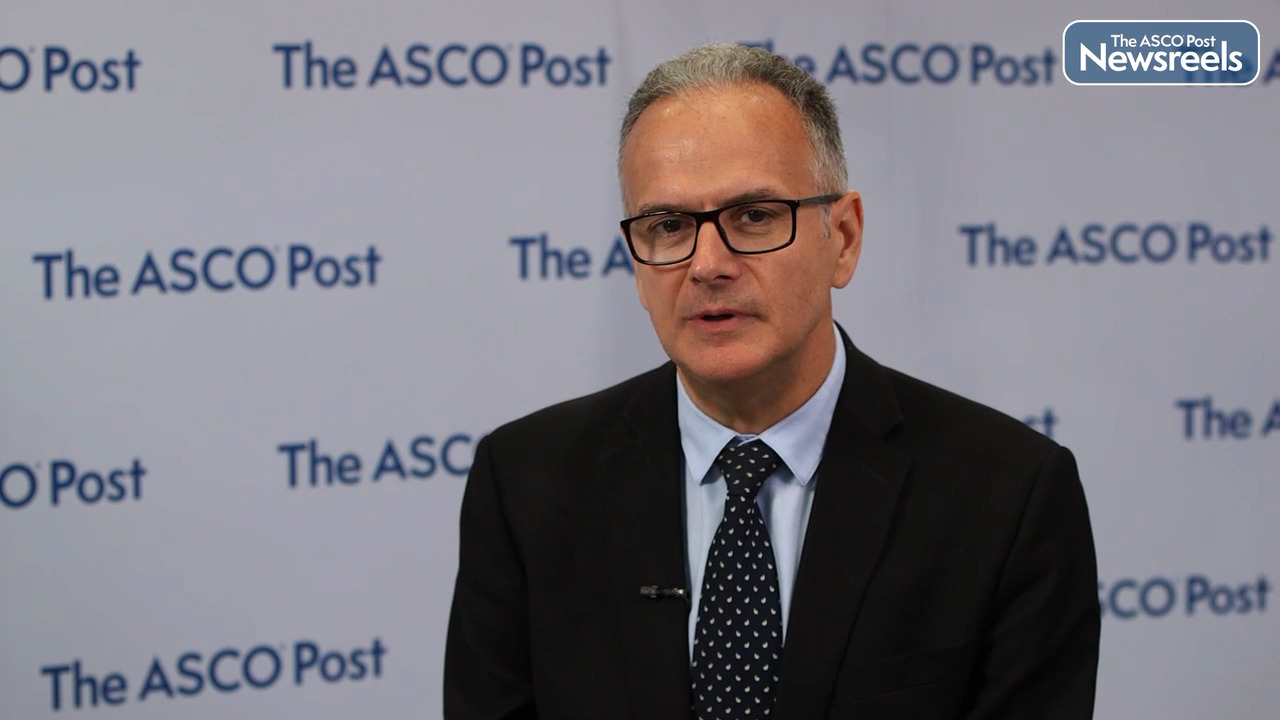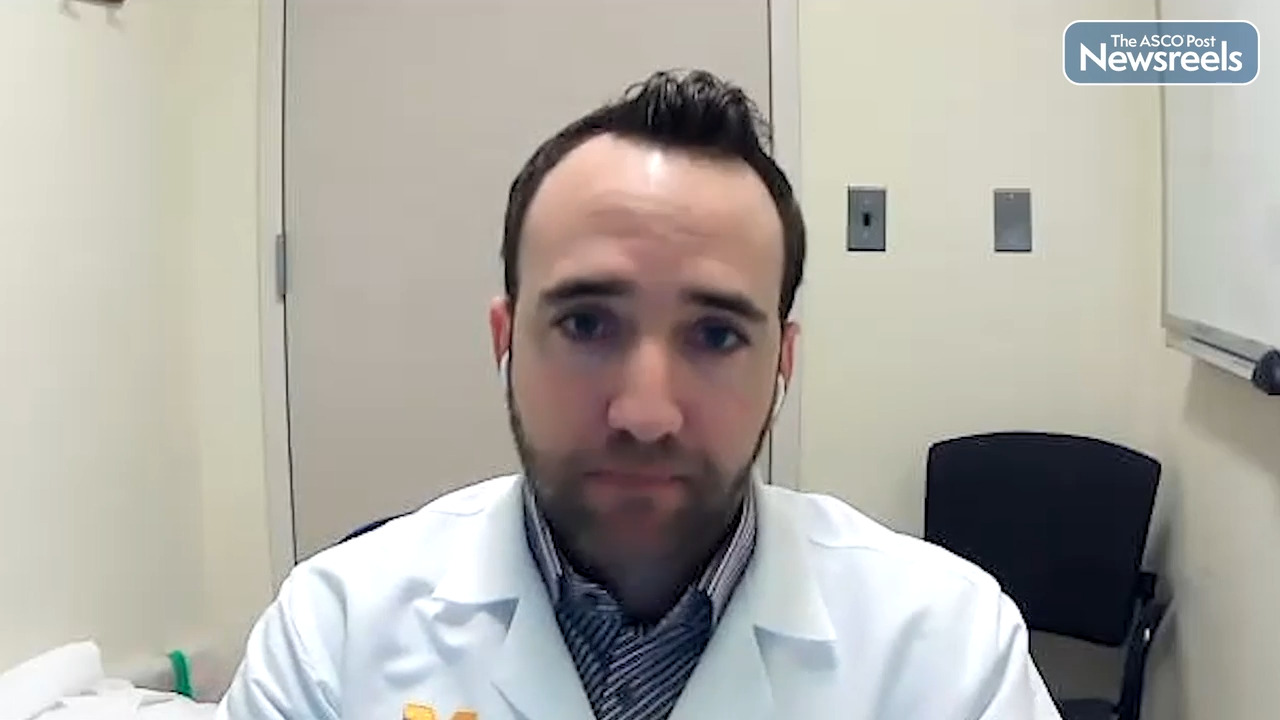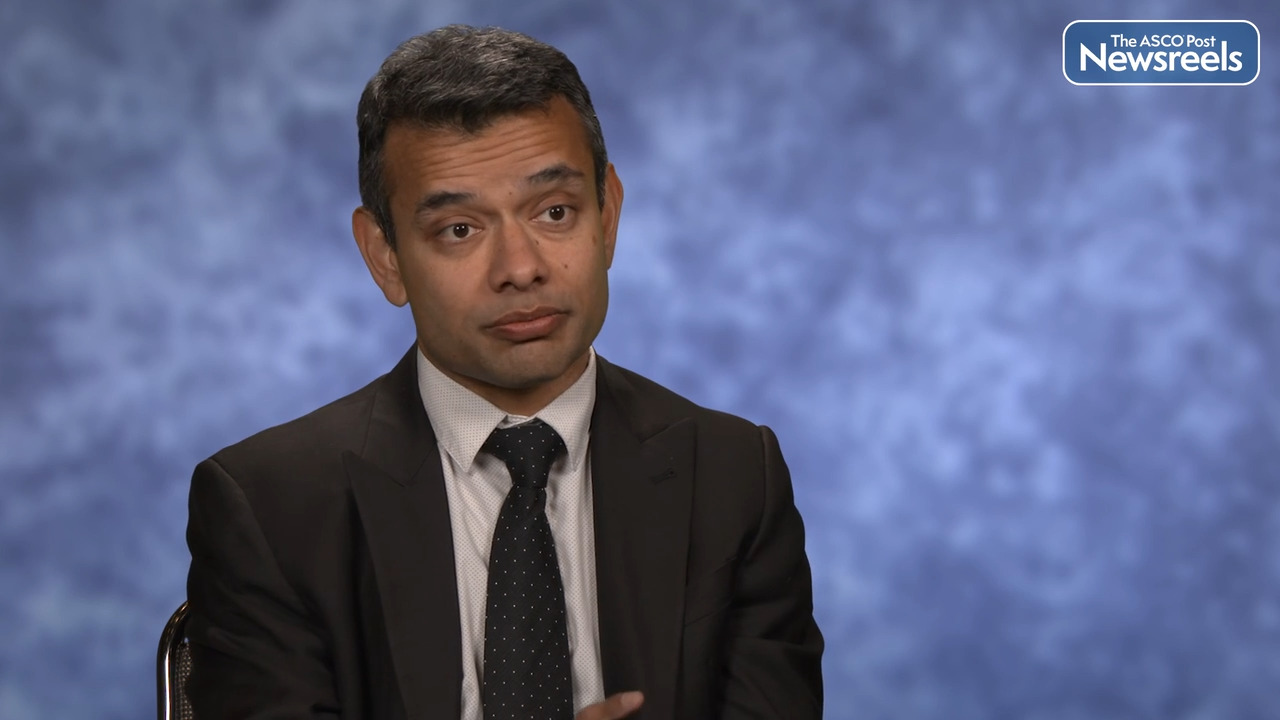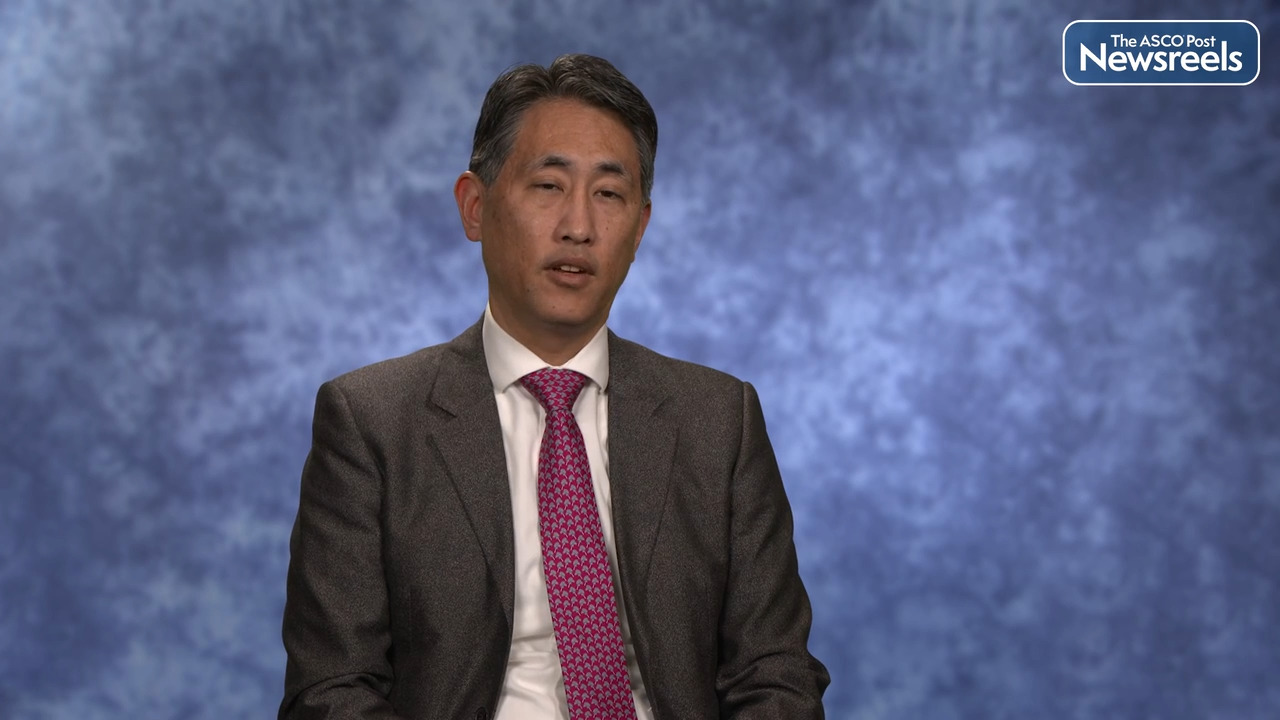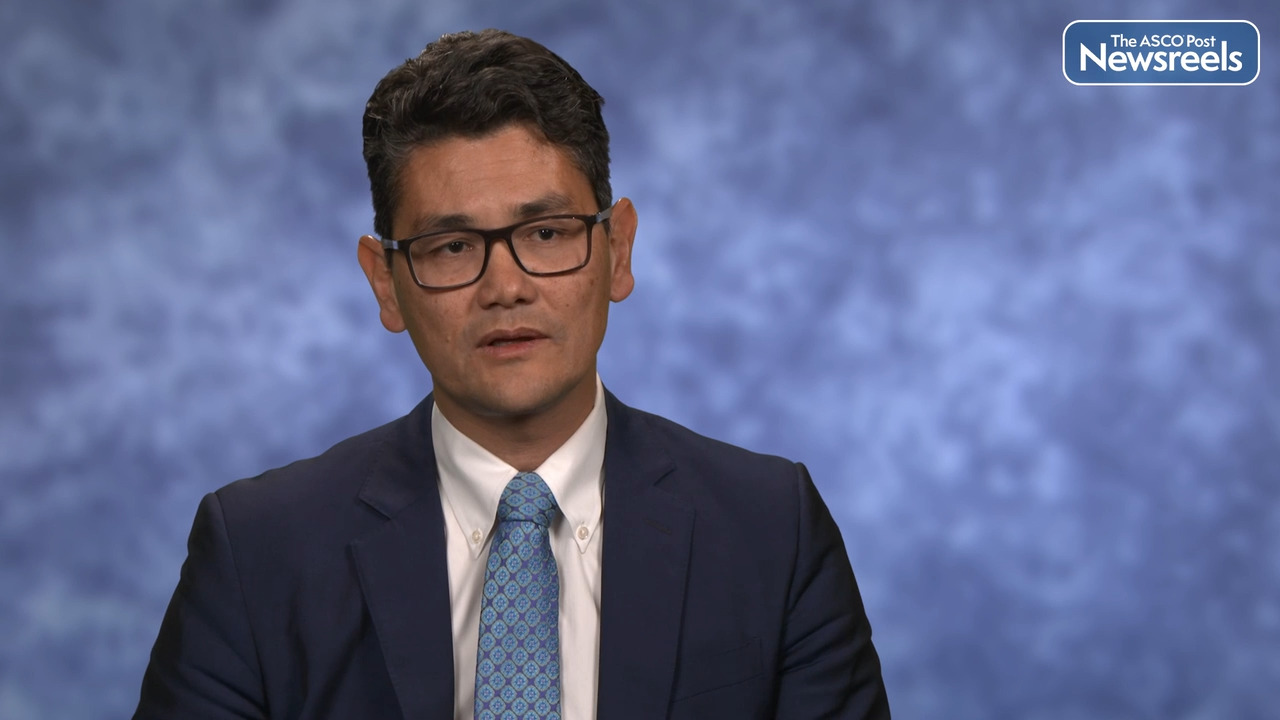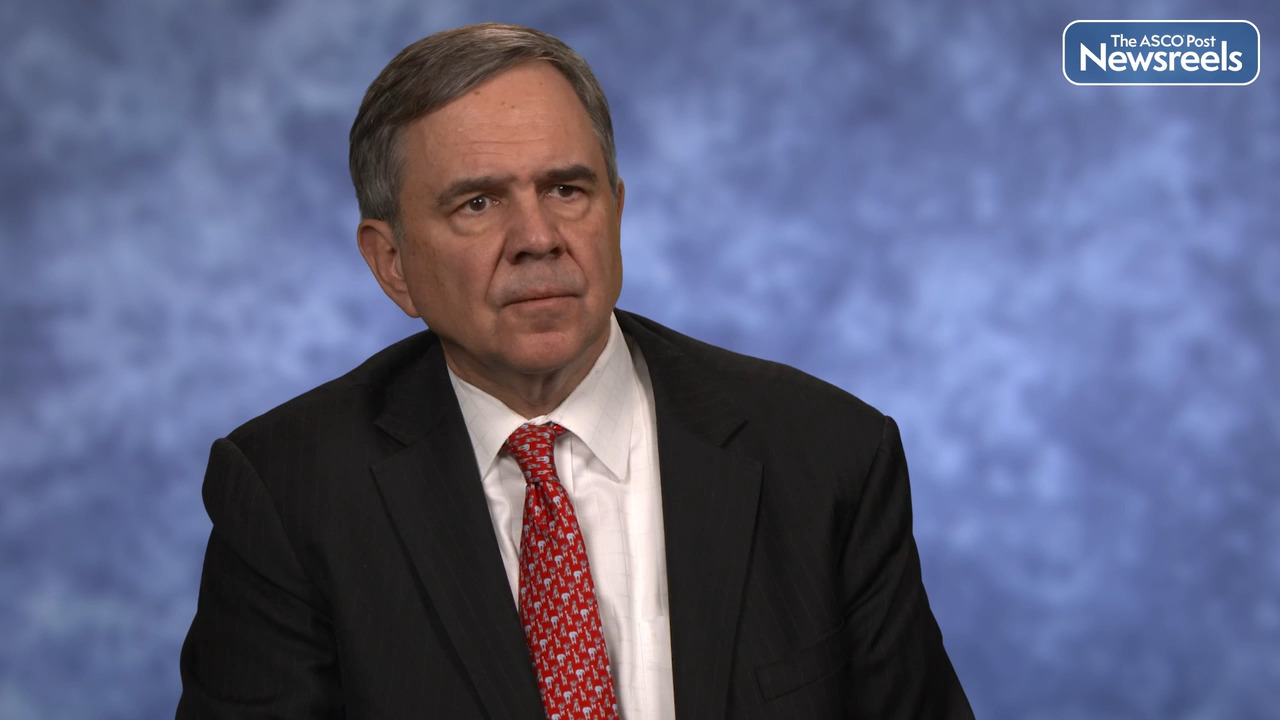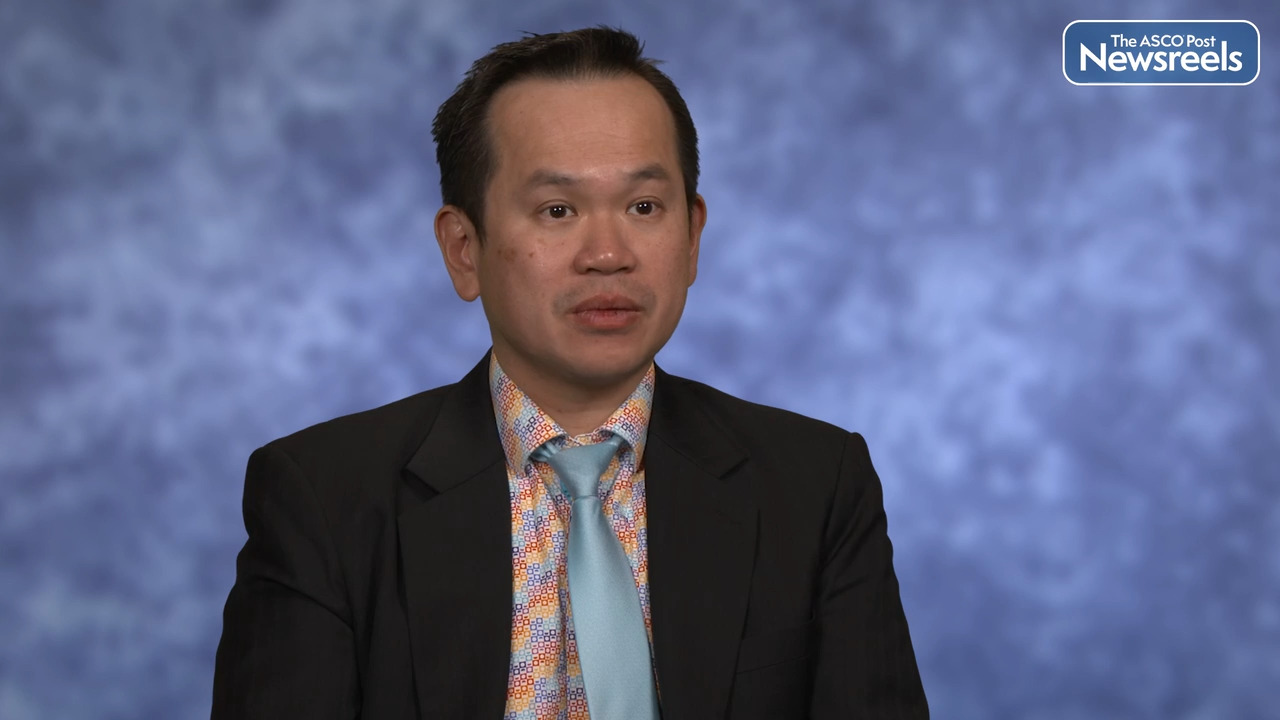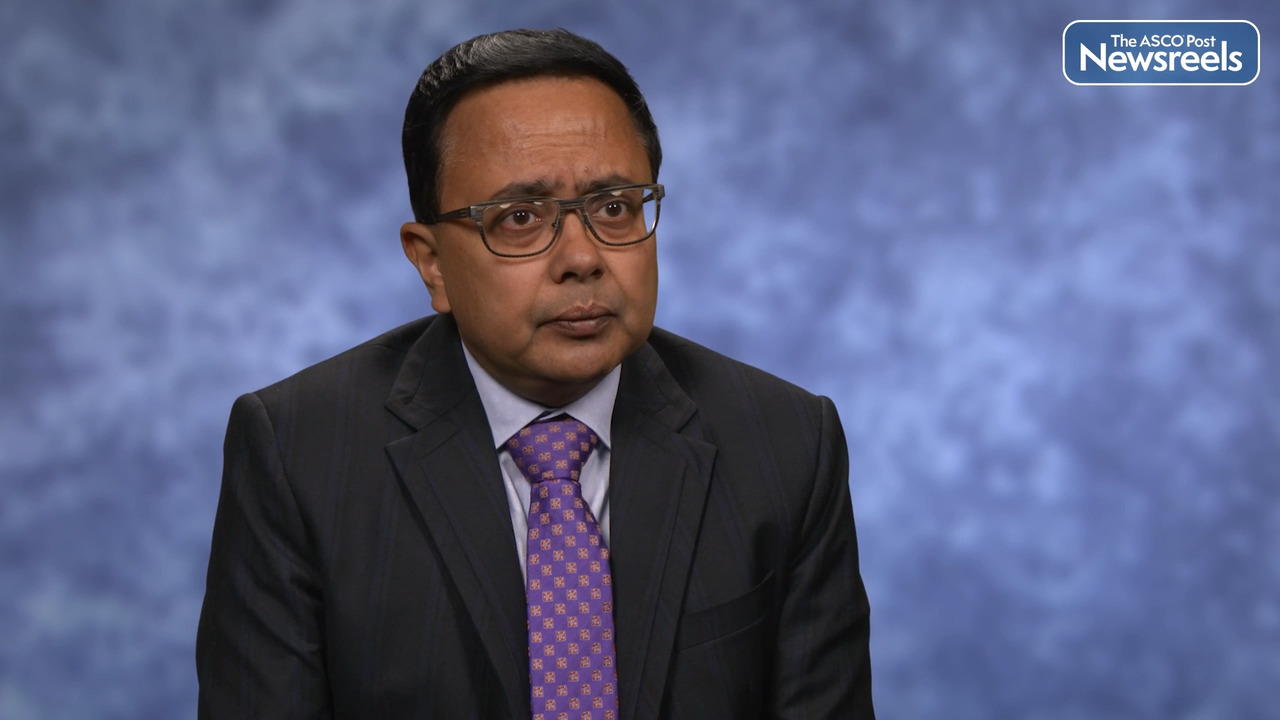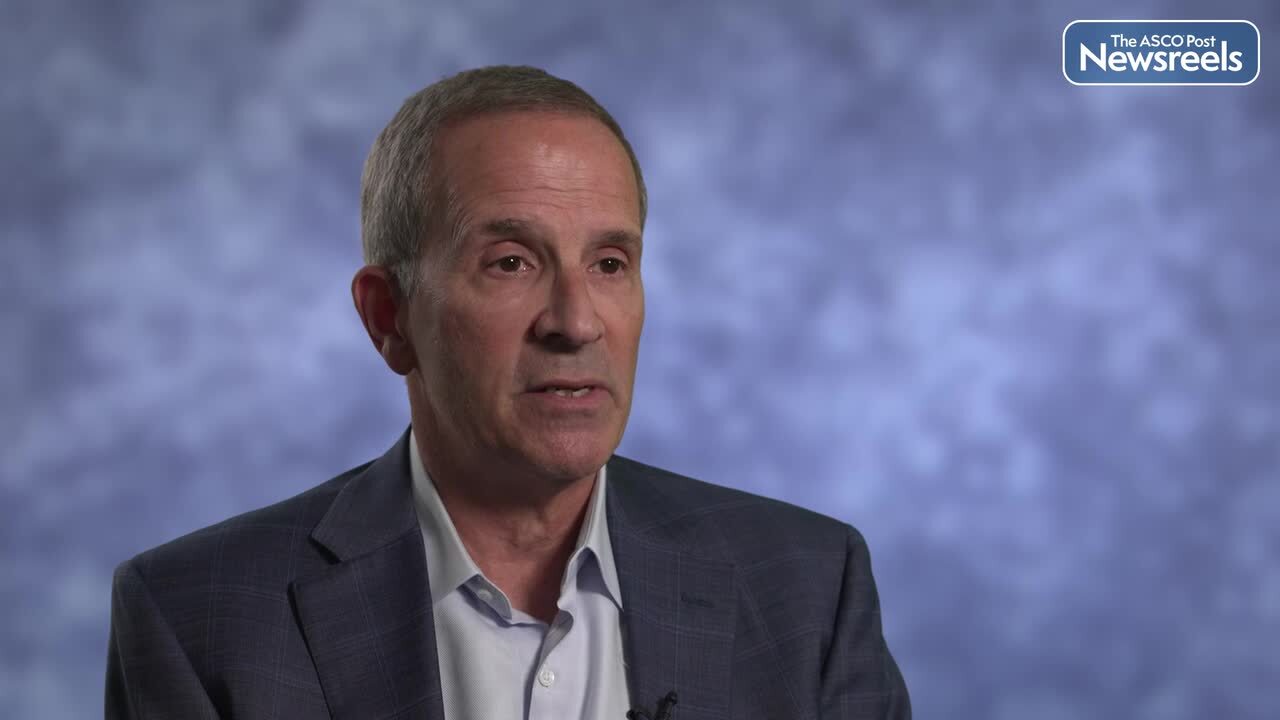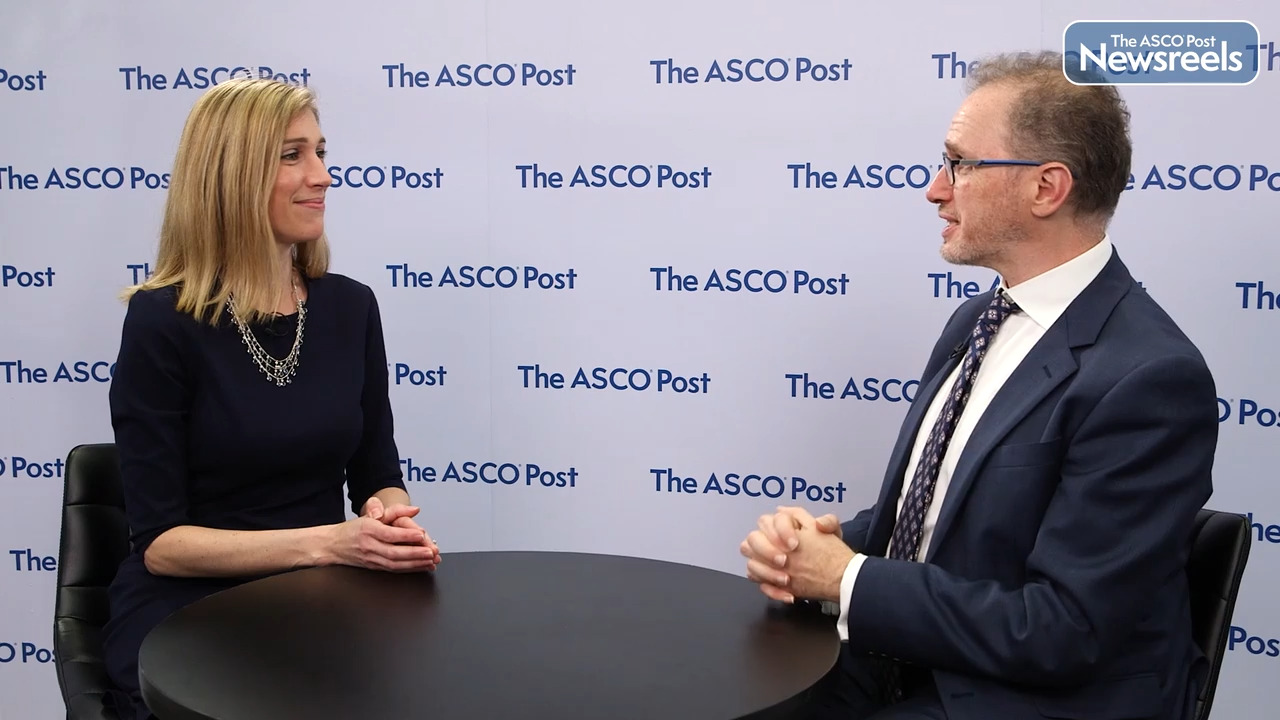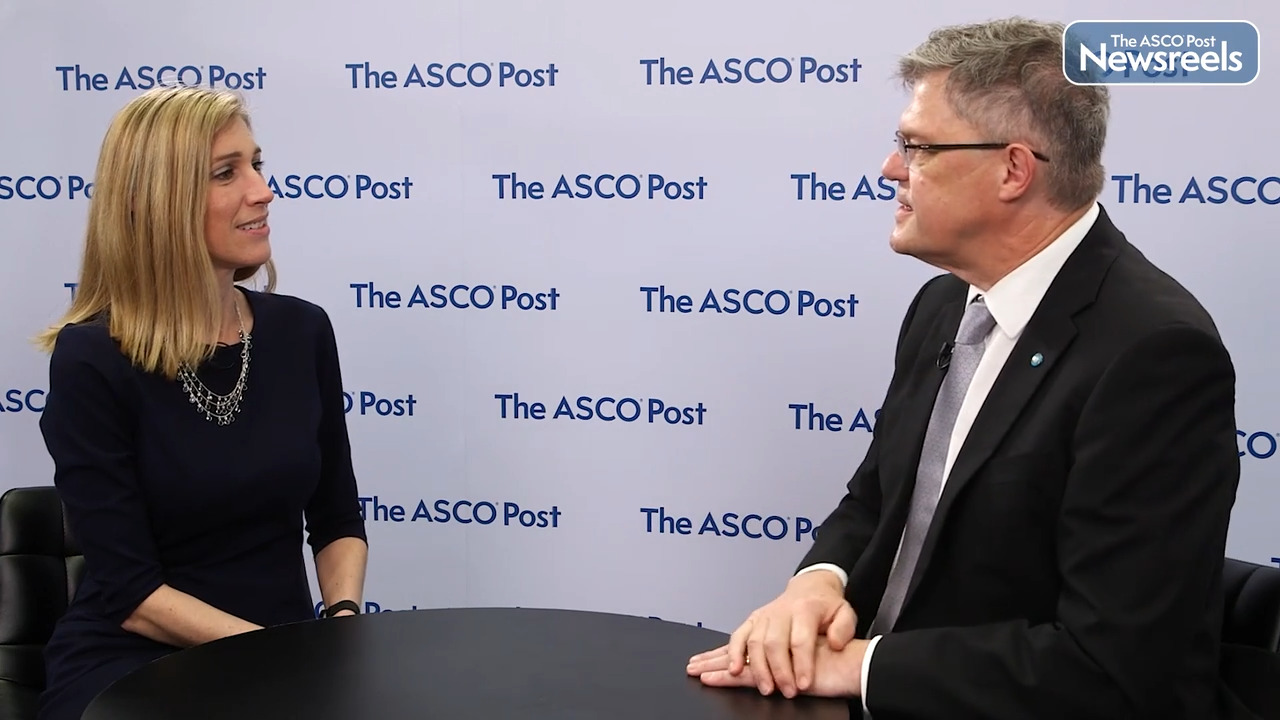Combination Treatment and Patient Selection for Relugolix vs Leuprolide
Atish D. Choudhury, MD, PhD, a medical oncologist and clinical/translational investigator at the Lank Center for Genitourinary Oncology at Dana-Farber Cancer Institute, discusses current guideline recommendations for the use of relugolix and leuprolide, relugolix as a combination backbone, and important considerations when applying these data to clinical practice. References 1. De La Cerda J, Dunshee C, Gervasi L, et al: A phase I clinical trial evaluating the safety and dosing of relugolix with novel hormonal therapy for the treatment of advanced prostate cancer. Target Oncol 3:383-390, 2023. 2. George DJ, Saad F, Cookson MS, et al: Impact of concomitant prostate cancer medications on efficacy and safety of relugolix versus leuprolide in men with advanced prostate cancer. Clin Genitourin Cancer 3:383-392, 2023. 3. Brown G, Belkoff L, Hafron JM, et al: Coadministration of apalutamide and relugolix in patients with localized prostate cancer at high risk for metastases. Target Oncol 1:95-103, 2023.
Oral vs Injectable Agents for Androgen-Deprivation Therapy in Prostate Cancer
Atish D. Choudhury, MD, PhD, a medical oncologist and clinical/translational investigator at the Lank Center for Genitourinary Oncology at Dana-Farber Cancer Institute, discusses forms of hormonal therapy for patients with prostate cancer, with a focus on the HERO trial, which evaluated oral relugolix vs injectable leuprolide in patients with advanced hormone-sensitive disease. Dr. Choudhury touches on additional analyses from HERO as well, including the effects seen with relugolix on major cardiovascular events. References 1. Shore ND, Saad F, Cookson MS, et al: Oral relugolix for androgen-deprivation therapy in advanced prostate cancer. N Engl J Med 382:2187-2196, 2020. 2. Saad F, George DJ, Cookson MS, et al: Relugolix vs leuprolide effects on castration resistance-free survival from the phase 3 HERO study in men with advanced prostate cancer. Cancers 15:4854, 2023. 3. Tombal B, Collins S, Morgans AK, et al: Impact of relugolix versus leuprolide on the quality of life of men with advanced prostate cancer: Results from the phase 3 HERO study. Eur Urol 6:579-57, 2023. 4. Spratt DE, George DJ, Shore ND, et al: Efficacy and safety of radiotherapy plus relugolix in men with localized or advanced prostate cancer. JAMA Oncol 5:594-602, 2024.
Case 3: Recurrent Low-Volume Metastatic Hormone-Sensitive Prostate Cancer
This is Part 3 of Targeted Approaches to Metastatic Hormone-Sensitive Prostate Cancer, a three-part video roundtable series. Scroll down to watch the other videos from this roundtable. In this video, Drs. Alicia Morgans, Charles Ryan, and David VanderWeele discuss the management of recurrent low-volume metastatic hormone-sensitive prostate cancer (mHSPC). The patient is a 62-year-old man with a history of localized prostate cancer treated with radical prostatectomy 3 years ago. His PSA has started to increase over the past 6 months and is now 0.7 ng/mL. His comorbidities include metabolic syndrome. A PSMA PET scan reveals several retroperitoneal lymph node metastases and a small pelvic lesion. In the conversation that follows, the faculty discuss whether systemic treatment or metastasis-directed therapy would be more appropriate for this patient with recurrent low-volume mHSPC, factors (including genetic testing) that influence the optimal duration of treatment, and managing cardiovascular risk factors.
Case 2: High-Risk De Novo Metastatic Hormone-Sensitive Prostate Cancer
This is Part 2 of Targeted Approaches to Metastatic Hormone-Sensitive Prostate Cancer, a three-part video roundtable series. Scroll down to watch the other videos from this roundtable. In this video, Drs. Alicia Morgans, Charles Ryan, and David VanderWeele discuss the treatment of high-risk de novo metastatic hormone-sensitive prostate cancer (mHSPC). The patient is a 62-year-old man with benign prostatic hyperplasia who has noted worsening urinary symptoms over the past 12 weeks. His PSA is 9.3 ng/mL, and a prostate biopsy demonstrates Gleason 4+4, grade group 4 prostate adenocarcinoma. Conventional CT is negative for metastatic disease, but PSMA PET/CT reveals multiple areas of vertebral body involvement and retroperitoneal lymph node metastases. He has no actionable alterations. In the conversation that follows, the faculty discuss how the imaging findings impact treatment considerations for this patient with high-volume mHSPC, whether treatment options would change in the presence of an HRR mutation, and factors to consider when choosing an androgen receptor pathway inhibitor.
Case 1: De Novo High-Volume Metastatic Hormone-Sensitive Prostate Cancer With PTEN Deficiency
This is Part 1 of Targeted Approaches to Metastatic Hormone-Sensitive Prostate Cancer, a three-part video roundtable series. Scroll down to watch the other videos from this roundtable. In this video, Drs. Alicia Morgans, Charles Ryan, and David VanderWeele discuss the treatment of de novo high-volume metastatic hormone-sensitive prostate cancer with PTEN deficiency. The patient is a 68-year-old man who presented with worsening back pain. X-rays demonstrated an area in L1 concerning for metastatic cancer, and he had a prostate-specific antigen of 23 ng/mL. After a staging workup, he was found to have multifocal bone metastases consistent with de novo high-volume metastatic hormone-sensitive prostate cancer. In the conversation that follows, the faculty discuss the importance of upfront germline and somatic genetic testing in patients with mHSPC, treatment options for patients with PTEN deficiency, managing adverse events associated with capivasertib, and more.
Gerhardt Attard, MD, PhD, on a Novel Regimen for Metastatic Castration-Sensitive Prostate Cancer With HRR Alterations
Gerhardt Attard, MD, PhD, of the Cancer Institute, University College London, presents findings from the phase III AMPLITUDE trial, which looked at the combination of niraparib and abiraterone acetate plus prednisone for patients with metastatic castration-sensitive prostate cancer with alterations in homologous recombination repair (HRR) genes (Abstract LBA5006).
Eric Huttenlocher Bent, MD, PhD, on Oligometastatic Prostate Cancer: Intensified Hormonal Blockade
Eric Huttenlocher Bent, MD, PhD, of Memorial Sloan Kettering Cancer Center, reviews results from the phase II Metacure trial (cohorts B2 and the B2 expansion), which looked at the efficacy of stereotactic body radiotherapy for PSMA-PET–detected oligometastatic prostate adenocarcinoma (Abstract 5014).
Praful Ravi, MBBChir, MRCP, on High-Risk Localized Prostate Cancer: Docetaxel With ADT and Radiotherapy
Praful Ravi, MBBChir, MRCP, of Dana-Farber Cancer Institute, presents findings from an ICECaP individual patient-data meta-analysis of randomized controlled trials on a treatment strategy used in high-risk localized prostate cancer (Abstract 5013).
Nicholas D. James, PhD, FRCP, MBBS, on Using AI to Identify Benefit From Prostate Cancer Therapy
Nicholas D. James, PhD, FRCP, MBBS, of The Institute of Cancer Research and The Royal Marsden NHS Foundation Trust, describes the use of a multimodal artificial intelligence (AI) model to identify benefit from second-generation androgen receptor pathway inhibitors in patients with high-risk nonmetastatic prostate cancer participating in the STAMPEDE trial (Abstract 5001).
Alicia K. Morgans, MD, MPH, FASCO, on How Does Androgen Receptor Inhibition Affect Quality of Life?
Alicia K. Morgans, MD, MPH, FASCO, of Dana-Farber Cancer Institute, discusses health-related quality-of-life data from the phase III ARANOTE trial, which evaluated the androgen receptor inhibitor darolutamide in combination with androgen-deprivation therapy (ADT) vs ADT plus placebo for patients with metastatic hormone-sensitive prostate cancer (Abstract 5004).
Andrew J. Armstrong, MD, MS, on ARCHES: 5-Year Overall Survival Follow-up
Andrew J. Armstrong, MD, MS, of Duke Cancer Institute Center for Prostate and Urologic Cancers, Duke University School of Medicine, discusses the 5-year overall survival analysis of the ARCHES trial, which investigated enzalutamide plus androgen-deprivation therapy in patients with metastatic hormone-sensitive prostate cancer (Abstract 5005).
Michael Schweizer, MD: EZH2 Inhibitor Plus Enzalutamide in mCRPC
Michael Schweizer, MD, of the University of Washington and Fred Hutchinson Cancer Center, discusses findings from a randomized dose-expansion study of the investigational EZH2 inhibitor mevrometostat in combination with enzalutamide in patients with metastatic castration-resistant prostate cancer (mCRPC) (Abstract LBA138).
Neeraj Agarwal, MD, FASCO, on mCRPC: Talazoparib Plus Enzalutamide as First-Line Treatment
Neeraj Agarwal, MD, FASCO, of Huntsman Cancer Institute, presents data from cohort 1 of the phase III TALAPRO-2 trial—final overall survival data, an update on radiographic progression–free survival, and safety follow-up—which included patients with metastatic castration-resistant prostate cancer (mCRPC) unselected for homologous recombination repair gene alterations (Abstract LBA18).
Karim Fizazi, MD, PhD, on HRR-Deficient mCRPC: Final Overall Survival in TALAPRO-2
Karim Fizazi, MD, PhD, of Institut Gustave Roussy, University of Paris-Saclay, reviews final overall survival results from cohort 2 of the phase III TALAPRO-2 trial, which investigated the combination of talazoparib and enzalutamide in patients with homologous recombination repair (HRR)-deficient metastatic castration-resistant prostate cancer (mCRPC) (Abstract LBA141).
William Aronson, MD, on a Specialized Diet in Men on Active Surveillance for Prostate Cancer
William Aronson, MD, of the VA Greater Los Angeles Healthcare System, discusses findings from the CAPFISH-3 trial, which investigated whether a high omega-3, low omega-6 fatty acid diet with fish oil capsules decreased Ki-67 levels in men with prostate cancer on active surveillance (Abstract 312).
Masood Moghul, PhD, on a Mobile Prostate Cancer Clinical Unit: Findings From the Man Van
Masood Moghul, PhD, of The Institute of Cancer Research and The Royal Marsden Hospital NHS Foundation Trust, describes the impact of a nurse-led mobile clinical unit on targeted screening invitations to men at high risk for prostate cancer in disadvantaged communities in London (Abstract 317).
Omid Yazdanpanah, MD, on Metastatic Castration-Resistant Prostate Cancer: LuPSMA With or Without ARPIs
Omid Yazdanpanah, MD, of the University of California, Irvine, presents findings from a secondary analysis of the VISION trial, which compared the efficacy and safety of LuPSMA in patients treated with vs without concomitant androgen receptor pathway inhibitors (ARPIs) (Abstract 121).
Nicholas D. James, PhD, FRCP, MBBS, on an ADT Option: Transdermal Estradiol Patches
Nicholas D. James, PhD, FRCP, MBBS, of The Institute of Cancer Research and The Royal Marsden Hospital NHS Foundation Trust, discusses findings from an embedded phase II randomized study from the STAMPEDE trial. The study assessed the efficacy and toxicity of transdermal estradiol patches vs luteinizing hormone–releasing hormone analogs in patients with M1 prostate cancer (Abstract 21).
Benjamin Maughan, MD, PharmD, on Exercise Therapy for Patients With Advanced Prostate Cancer
Benjamin Maughan, MD, PharmD, of Huntsman Cancer Institute, discusses the effects of a 12-week, structured, guided exercise program called Personal Optimism With Exercise Recovery (POWER) on fatigue and peak aerobic exercise capacity in patients with advanced prostate cancer receiving androgen-deprivation therapy (Abstract 120).
Alicia Morgans, MD, MPH, and Samuel R. Denmeade, MD, on Prostate Cancer: Results From the TRANSFORMER Trial
Alicia Morgans, MD, MPH, of Dana-Farber Cancer Institute, and Samuel R. Denmeade, MD, of Johns Hopkins University School of Medicine, discuss a study showing that patients with metastatic castration-resistant prostate whose disease is progressing on abiraterone with androgen-receptor alterations detected in the blood may benefit from bipolar androgen therapy. Routine liquid biopsy testing may enable further adoption of bipolar treatment (Abstract 5003).
Alicia Morgans, MD, MPH, and Karim Fizazi, MD, PhD, on Prostate Cancer: Study Findings on Health-Related Quality of Life and Pain
Alicia Morgans, MD, MPH, of Dana-Farber Cancer Institute, and Karim Fizazi, MD, PhD, of Institut Gustave Roussy and the University of Paris-Saclay, discuss a second interim analysis of the health-related quality of life and pain outcomes in the PSMAfore study (Abstract 5003).
Christos Kyriakopoulos, MD, on Prostate Cancer: CHAARTED2 Trial Results on Cabazitaxel and Abiraterone
Christos Kyriakopoulos, MD, of the University of Wisconsin Carbone Cancer Center, discusses data suggesting that adding cabazitaxel to abiraterone and prednisone improves progression-free survival in patients with metastatic castration-resistant prostate cancer who previously received chemohormonal therapy with docetaxel for hormone-sensitive disease compared with abiraterone plus prednisone alone (Abstract LBA5000).
Alicia Morgans, MD, MPH, and Susan Halabi, PhD, on Prostate Cancer: New Findings on Classifying Patients Into Risk Groups
Alicia Morgans, MD, MPH, of Dana-Farber Cancer Institute, and Susan Halabi, PhD, of the Duke Cancer Institute and Duke University School of Medicine, discuss a clinical-genetic model that identified novel circulating tumor DNA alterations that are prognostic of overall survival and may help to classify patients with metastatic castration-resistant prostate cancer into risk groups useful for selecting trial participants (Abstract 5007).
Anthony M. Joshua, MBBS, PhD, on Low-Risk Prostate Cancer and Metformin: New Trial Data
Anthony M. Joshua, MBBS, PhD, of Princess Margaret Cancer Centre, discusses results from the MAST study, which explored the question of whether metformin could reduce disease progression in men with low-risk prostate cancer who are undergoing active surveillance (LBA5002).
Sumanta K. Pal, MD, on Prostate Cancer: Impact of the Microbiome on Immune Therapy
Sumanta K. Pal, MD, of City of Hope, discusses the ways in which the composition of the gut microbiome may impact the outcome of immune therapy. Methods such as fecal microbiome transplant hold promise as a means of augmenting the effect of treatment and, according to Dr. Pal, potentially resensitizing patients to therapies.
Umang Swami, MD, on Prostate Cancer: Differences in Genomic, Transcriptomic, and Immune Landscape Based on Site of Metastasis
Umang Swami, MD, of Huntsman Cancer Institute at the University of Utah, describes the molecular and immunologic mechanisms of metastatic tropism in advanced prostate cancer, data that may facilitate future drug development. In patients with metastatic disease, specific sites are associated with differential overall survival, but the biological reasons have not been fully explored (Abstract 21).
Maha H.A. Hussain, MD, on Prostate Cancer: New Data on Abiraterone and Prednisone Plus Olaparib
Maha H.A. Hussain, MD, of the Robert H. Lurie Comprehensive Cancer Center, Northwestern University, discusses phase II findings from the BRCAAway trial. This study showed that in patients with metastatic castration-resistant prostate cancer with BRCA1/2 or ATM alterations, abiraterone and prednisone plus olaparib was well tolerated and resulted in a longer progression-free survival than either agent alone or sequentially.
Neeraj Agarwal, MD, on Prostate Cancer: Phase III Trial Update on Cabozantinib, Atezolizumab, and Hormonal Therapy
Neeraj Agarwal, MD, of Huntsman Cancer Institute at the University of Utah, discusses results of the CONTACT-2 trial, which showed cabozantinib plus atezolizumab improved radiographic progression–free survival of patients with metastatic castration-resistant prostate cancer vs a second novel hormonal therapy (NHT) in patients who had experienced disease progression on a prior NHT and have extrapelvic nodal or visceral disease. The benefits were more pronounced in patients with liver metastasis and in those who previously received docetaxel (Abstract 18).
Rana R. McKay, MD, on Mutated Prostate Cancer, PARP Inhibition, and Radical Prostatectomy
Rana R. McKay, MD, of the University of California, San Diego, discusses phase II findings from the Neptune study of neoadjuvant olaparib plus androgen-deprivation therapy followed by radical prostatectomy in patients with intermediate-risk or high-risk prostate cancer marked by germline or somatic BRCA1/2 gene alterations. This population generally has inferior outcomes, and PARP inhibition has shown efficacy in these patients.
Stephen J. Freedland, MD, on Managing Prostate Cancer in Transgender Women
Stephen J. Freedland, MD, of Cedars-Sinai Medical Center, discusses the incidence of prostate cancer in transgender women. Although the rates of disease appear lower than in cisgender men, Dr. Freedland notes the risk is not as limited as case reports may suggest. He also discusses interpreting PSA values and rises in PSA for patients on gender-affirming hormone therapies.
Samson W. Fine, MD, on Clinical Significance of Atypical Small Acinar and Intraductal Proliferations in the Prostate
Samson W. Fine, MD, of Memorial Sloan Kettering Cancer Center, discusses the evolving spectrum of atypical intraductal proliferations in the prostate, from high-grade prostatic intraepithelial neoplasia to intraductal carcinoma. He describes several clinical challenges, including: assessment and terminology of cribriform architecture; pathologic reporting in various biopsy scenarios; and association with genetic findings.
William J. Catalona, MD, on Genetic Testing in Prostate Cancer: Expert Review
William J. Catalona, MD, of Northwestern University Feinberg School of Medicine, reviews the genetic landscape in prostate cancer, including BRCA2 and ATM, two important mutations for aggressive disease; the clinical implications of germline testing such as guiding screening and disease management, as well as identifying patients at high risk for aggressive prostate cancer; and the role of somatic testing, especially in advanced disease.
Alicia K. Morgans, MD, MPH, and Karim Fizazi, MD, on Prostate Cancer: Phase III Results on Talazoparib Plus Enzalutamide as First-Line Treatment
Alicia K. Morgans, MD, MPH, of Dana-Farber Cancer Institute, and Karim Fizazi, MD, of Institut Gustave Roussy, University of Paris-Saclay, discuss findings from the TALAPRO-2 study, which showed that talazoparib plus enzalutamide improved radiographic progression–free survival over standard-of-care enzalutamide as first-line treatment for patients with metastatic castration-resistant prostate cancer and HRR gene alterations. This regimen also delayed the time to deterioration in global health status and quality of life (Abstract 5004).
Alicia K. Morgans, MD, MPH, and Praful Ravi, MRCP, MBBChir, on Localized Prostate Cancer: Prognostic Impact of PSA Nadir
Alicia K. Morgans, MD, MPH, and Praful Ravi, MRCP, MBBChir, both of Dana-Farber Cancer Institute, discuss an individual patient-data analysis of randomized trials from the ICECAP collaborative. A PSA nadir of ≥ 0.1 ng/mL within 6 months after radiotherapy completion was prognostic for prostate cancer–specific, metastasis-free, and overall survival in patients receiving radiotherapy plus androgen-deprivation therapy for localized prostate cancer. These findings may help identify patients for therapy de-escalation trials (Abstract 5002).
Alberto Bossi, MD, on Prostate Cancer: PEACE-1 Trial Findings on Radiotherapy Plus Systemic Treatment
Alberto Bossi, MD, of Institut Gustave Roussy, discusses phase III findings showing that combining prostate radiotherapy with systemic treatment did not improve overall survival in men with de novo metastatic castration-sensitive prostate cancer and low metastatic burden. However, best outcomes (radiographic progression–free-survival and overall survival) were observed in men receiving the standard of care plus abiraterone acetate plus prednisone with radiotherapy (Abstract LBA5000).
Locally Advanced High-Risk Prostate Cancer
This is Part 3 of Novel Hormonal Therapies for Prostate Cancer, a three-part video roundtable series. Scroll down to watch the other videos from this Roundtable. In this video, Drs. Alicia K. Morgans, Neeraj Agarwal, and David VanderWeele discuss the management of locally advanced high-risk prostate cancer. The patient is a 57-year-old man who presents to his urology with increasing nocturia symptoms. His PSA is 12.4 ng/mL, and an MRI shows a PI-RADS 5 lesion in the right apex concerning for prostate cancer. Biopsy confirms Gleason 4+4 prostate adenocarcinoma, and several retroperitoneal lymph node metastases are revealed on PSMA PET scan. He is found to have a germline BRCA2 mutation, and his team is considering treatment with radiation plus androgen-deprivation therapy, abiraterone acetate, and prednisone per STAMPEDE. The faculty discuss the optimal treatment workup for patients with locally advanced high-risk prostate cancer, the importance of germline genetic testing, the benefits of intensified treatment with ADT plus abiraterone acetate, and the role of gonadotropin-releasing hormone antagonists in improving testosterone recovery and maintaining quality of life.
De Novo Metastatic Hormone-Sensitive Prostate Cancer
This is Part 2 of Novel Hormonal Therapies for Prostate Cancer, a three-part video roundtable series. Scroll down to watch the other videos from this Roundtable. In this video, Drs. Alicia K. Morgans, Neeraj Agarwal, and David VanderWeele discuss the management of de novo metastatic hormone-sensitive prostate cancer. The patient is a 74-year-old man who presents to his primary care physician due to worsening back pain. An x-ray reveals an area in T12 concerning for metastatic cancer, and his PSA is found to be 23 ng/mL. He completes staging workup, which demonstrates multifocal bone metastases and metastatic disease in the liver, and he is started on androgen-deprivation therapy (ADT) as initial treatment for his metastatic disease. The faculty discuss ways to reduce the risk of complications from ADT for patients with metastatic hormone-sensitive prostate cancer, the role of intensified treatment with couplet or triplet ADT combinations, and the importance of co-management with primary care or cardiology.
Biochemical Recurrence of Prostate Cancer
This is Part 1 of Novel Hormonal Therapies for Prostate Cancer, a three-part video roundtable series. Scroll down to watch the other videos from this Roundtable. In this video, Drs. Alicia K. Morgans, Neeraj Agarwal, and David VanderWeele discuss biochemical recurrence in prostate cancer. The patient is a 64-year-old man with a history of localized prostate cancer treated with radical prostatectomy, Gleason 4+4, and positive extracapsular extension and positive right apical margin. Due to high-risk features, he underwent adjuvant radiation therapy. Although his PSA was initially undetectable, it started to increase after 2 years, reaching 12.9 ng/mL. He was negative for evidence of recurrent disease on bone scan, and his testosterone level was normal. The faculty discuss the challenge of timing treatment in the setting of biochemical recurrence. They also highlight the crucial importance of addressing comorbidities, such as metabolic syndrome, through the management of reversible cardiovascular risk factors to better prepare patients starting androgen-deprivation therapy.
Alex K. Bryant, MD, on PSA Screening and Metastatic Prostate Cancer in the VA Health-Care System
Alex K. Bryant, MD, of the University of Michigan, examined Veterans Administration (VA) facilities in which lower prostate-specific antigen (PSA) screening rates were associated with a subsequent increased incidence of metastatic prostate cancer, particularly among men aged 70 and older. From 2008 to 2019, PSA screening rates have declined in the national VA system, data that may be used to inform shared decision-making about the potential benefits of screening for those who wish to reduce their risk of advanced prostate cancer. (Abstract 298).
Rahul Aggarwal, MD, on Prostate Cancer: Phase III Data on Apalutamide and Androgen Deprivation in Relapsed Disease
Rahul Aggarwal, MD, of the University of California, San Francisco, discusses recent data from the PRESTO study, which showed that apalutamide plus androgen-deprivation therapy (ADT) for 12 months significantly prolonged PSA progression-free survival compared with ADT alone in patients with biochemically recurrent prostate cancer. These results provide support for the intensification of ADT in this setting. (Abstract LBA63).
Updates From City of Hope on Renal Cell, Prostate, and Urothelial Cancers
Sumanta K. Pal, MD, introduces his City of Hope colleagues, Hedyeh Ebrahimi, MD, MPH, who discusses the prevalence of dietary modification and supplement use in patients with metastatic renal cell carcinoma, and Daniela Castro, MSc, who discusses expanding eligibility criteria in kidney, prostate, and urothelial cancer trials to more accurately reflect the real-world population and reducing exclusion criteria. (Abstract 662, 612, 34, 453)
Scott T. Tagawa, MD, on Prostate Cancer: Phase II Results on Ketoconazole, Hydrocortisone, and an Anti-PSMA Antibody
Scott T. Tagawa, MD, of Weill Cornell Medicine, NewYork-Presbyterian Hospital, discusses study results showing that, the anti-PSMA (prostate-specific membrane antigen) monoclonal antibody J591 with ketoconazole and hydrocortisone, when radiolabeled with lutetium-177, leads to improved 18-month metastasis-free survival vs radiolabeling with indium-111 in patients with nonmetastatic (M0) castration-resistant prostate cancer. This supports the development of anti-PSMA radioimmunotherapy, although the optimal radionuclide and targeting agent are unknown. (Abstract LBA21).
Alan H. Bryce, MD, on Prostate Cancer: Phase III Results on Rucaparib, Docetaxel, and Androgen Pathway Inhibitor Therapy
Alan H. Bryce, MD, of the Mayo Clinic, discusses the final results of the primary endpoint of rPFS and interim results on overall survival among patients with chemotherapy-naive metastatic castration-resistant prostate cancer. The data showed that rucaparib improved radiographic progression-free survival compared with either docetaxel or abiraterone and enzalutamide in disease with BRCA1/2 alterations. (Abstract 18).
Daniel P. Petrylak, MD, on Prostate Cancer: Latest Data on Pembrolizumab Plus Docetaxel
Daniel P. Petrylak, MD, of the Yale Cancer Center, discusses phase III findings from the KEYNOTE-921 study, which was designed to assess the combination of pembrolizumab and docetaxel in the treatment of patients with metastatic castration-resistant prostate cancer. They had not received chemotherapy, but their disease progressed on the next-generation hormonal agent, or they could not tolerate the agent. (Abstract 19).
Paul L. Nguyen, MD, on Prostate Cancer: New Findings on Treatment With Salvage Radiotherapy, GnRH Agonist, Abiraterone, Prednisone, and Apalutamide
Paul L. Nguyen, MD, of Dana-Farber Cancer Institute and Harvard Medical School, discusses results from the FORMULA-509 study, which compared postoperative salvage radiotherapy and 6 months of GnRH agonist with or without abiraterone acetate/prednisone (AAP) and apalutamide, after radical prostatectomy. The study suggested that adding AAP and apalutamide to salvage radiotherapy, plus 6 months of androgen-deprivation therapy, may improve outcomes, particularly in the subgroup of patients with a prostate-specific antigen level higher than 0.5 ng/mL. (Abstract 303).
Neeraj Agarwal, MD, on Prostate Cancer: New Data on Talazoparib and Enzalutamide
Neeraj Agarwal, MD, of the Huntsman Cancer Institute, University of Utah, discusses phase III results from the TALAPRO-2 study, which suggested an improvement in radiographic progression-free survival with the combination of talazoparib and enzalutamide over standard-of-care enzalutamide alone as first-line treatment in patients with metastatic castration-resistant prostate cancer. The improvement was seen regardless of homologous recombination repair gene mutations. The combination regimen delayed the time to chemotherapy and worsening in global health status and quality of life. (Abstract LBA17).
Neal D. Shore, MD, on Prostate Cancer: Biomarker Analysis, Enzalutamide, and Active Surveillance
Neal D. Shore, MD, of Carolina Urologic Research Center/Genesis Care, discusses new data from the ENACT trial, which showed that patients with prostate cancer and the RNA biomarkers PAM50 and AR-A were likely to have better outcomes with enzalutamide treatment. The results suggest that such RNA biomarkers may help to identify patients who may benefit from enzalutamide treatment compared with active surveillance (Abstract 1385P).
Neal D. Shore, MD, on Germline Genetic Testing and Its Impact on Prostate Cancer Clinical Decision-Making
Neal D. Shore, MD, of the Carolina Urologic Research Center, discusses his study findings, showing that germline genetic testing influenced care for patients with prostate cancer. Men whose genetic test was positive for a pathogenic germline variant received more recommendations for changes to follow-up and treatment, and for testing and counseling of relatives, than did patients with negative or uncertain test results (Abstract 10500).
Alicia K. Morgans, MD, MPH, and Michael S. Hofman, MBBS, on Prostate Cancer: New Data on Lutetium-177–PSMA-617 (LuPSMA) vs Cabazitaxel
Alicia K. Morgans, MD, MPH, of Dana-Farber Cancer Institute, and Michael S. Hofman, MBBS, of Peter MacCallum Cancer Centre, University of Melbourne, discuss follow-up results on LuPSMA vs cabazitaxel in patients with metastatic castration-resistant prostate cancer progressing after docetaxel treatment. The findings suggest that LuPSMA is a suitable option for this population, with fewer adverse events, higher response rates, improved patient-reported outcomes, and similar overall survival compared with cabazitaxel (Abstract 5000).
Alicia K. Morgans, MD, MPH, and Ian D. Davis, PhD, MBBS, on Prostate Cancer: Updated Overall Survival Outcomes With Enzalutamide
Alicia K. Morgans, MD, MPH, of Dana-Farber Cancer Institute, and Ian D. Davis, PhD, MBBS, of Monash University and Eastern Health, discuss the latest findings from ANZUP Cancer Trials Group’s ENZAMET cooperative group trial of enzalutamide in patients with metastatic hormone-sensitive prostate cancer. The results corroborate the benefit of enzalutamide with improved overall survival, and involve some exploratory subgroup analyses (Abstract LBA5004).
